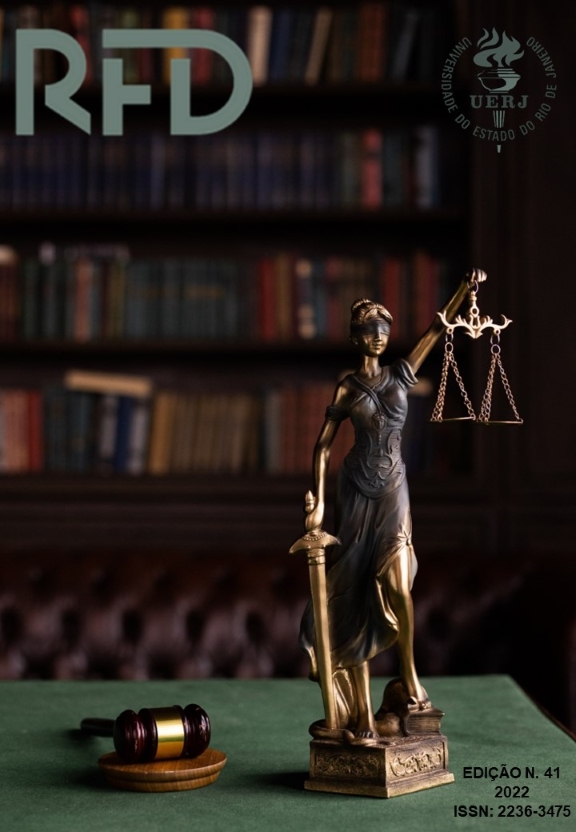QUANDO A EXCEÇÃO VIRA REGRA: A INDISCERNIBILIDADE ENTRE AUTORITARISMO E DEMOCRACIA NO DIREITO PROCESSUAL PENAL BRASILEIRO / WHEN EXCEPTION BECOMES RULE: THE INDISCERNIBILITY BETWEEN AUTHORITARIANISM AND DEMOCRACY IN BRAZILIAN CRIMINAL PROCEDURAL LAW
DOI:
https://doi.org/10.12957/rfd.2022.56969Keywords:
Democracia. Autoritarismo. Código de Processo Penal. Estado de exceção.Abstract
Resumo: A história do Brasil constitui-se a partir de um movimento pendular entre autoritarismo e democracia. Com a promulgação da Constituição Federal de 1988, a redemocratização foi formalizada, mas os traços autoritários do passado continuam presentes em documentos legais e nas práticas institucionais em pleno século XXI. Um retrato disso é o Código de Processo Penal. Ao alcançar os seus 80 anos, o referido documento traz inúmeros obstáculos à efetivação do texto constitucional. A partir disso, problematiza-se: em que medida o sistema de justiça penal, especialmente no tocante ao Direito Processual Penal, tem servido como instrumento autoritário no bojo do Estado Democrático de Direito instaurado em 1988 no Brasil? Emerge-se da hipótese, ao fim corroborada – com base na teoria do estado de exceção delineada, sobretudo, na filosofia de Giorgio Agamben –, sobre a zona de indiscernibilidade entre autoritarismo e democracia no Estado brasileiro, revelando a abstração dos valores democráticos e a concretude das marcas autoritárias. Neste sentido, observando-se o método fenomenológico-hermenêutico, a abordagem qualitativa, a técnica exploratória e os procedimentos bibliográfico e documental, o texto estrutura-se em duas seções e objetiva, respectivamente: a) analisar a institucionalização de discursos sociais autoritários no sistema de justiça penal; e b) refletir a conformação do estado de exceção na atuação do Poder Judiciário à luz do Direito Processual Penal.
Palavras-chave: Democracia. Autoritarismo. Código de Processo Penal. Estado de exceção.
Abstract: The history of Brazil is constituted from a pendular movement between authoritarianism and democracy. With the promulgation of the 1988 Federal Constitution, redemocratization was formalized, but the authoritarian traces of the past remain present in legal documents and institutional practices in the 21st century. A picture of this is the Criminal Procedure Code. Upon reaching its 80 years, the referred document brings numerous obstacles to the effectiveness of the constitutional text. From this, the question arises: to what extent has the criminal justice system, especially with regard to Criminal Procedural Law, served as an authoritarian instrument in the midst of the Democratic State of Law established in 1988 in Brazil? It emerges from the hypothesis, at the end corroborated - based on the theory of the state of exception outlined, above all, in the philosophy of Giorgio Agamben -, about the zone of indiscernibility between authoritarianism and democracy in the Brazilian State, revealing the abstraction of democratic values and the concreteness of authoritarian marks. In this sense, observing the phenomenological-hermeneutic method, the qualitative approach, the exploratory technique and the bibliographic and documentary procedures, the text is structured in two sections and aims, respectively: a) to analyze the institutionalization of authoritarian social discourses in the system criminal justice; and b) reflect the conformation of the state of exception in the performance of the Judiciary in the light of Criminal Procedure Law.
Keywords: Democracy. Authoritarianism. Criminal Procedure Code. Exception state.
Downloads
Published
How to Cite
Issue
Section
License
Copyright
oArticles published in the Revista da Faculdade de Direito da UERJ (RFD/UERJ)
The copyrights of the published articles belong to the Revista da Faculdade de Direito da UERJ (RFD/UERJ). Total or partial reproduction of the articles is allowed as long as the source is cited.
oPartial reproduction from other publications
Submitted papers that contain parts of text extracted from other publications must obey the specified limits to ensure originality of the submitted work. Plagiarism in all its forms constitutes unethical behavior and is unacceptable.
It is recommended to avoid reproduction of tables and illustrations from other publications. The article that contains reproduction of one or more tables and/or illustrations from other publications will only be sent for analysis if it is accompanied by written permission from the copyright holder of the original work for the specified reproduction in the Revista da Faculdade de Direito da UERJ (RFD/UERJ). The permission must be addressed to the author of the submitted work. Under no circumstances will the Journal of the Law School of the State University of Rio de Janeiro (RFD/UERJ) and the authors of the papers published in this journal transfer the rights thus obtained.
•The refused studies will be returned to the authors, if asked.

The Revista da Faculdade de Direito is licensed under a Creative Commons Atribuição 4.0 Internacional License.
This work is licensed under a Creative Commons 4.0 Attribution-No Derivation License.
This license allows copying and redistribution of the material in any medium or format for any purpose, even commercial, provided that the original authorship is acknowledged.










